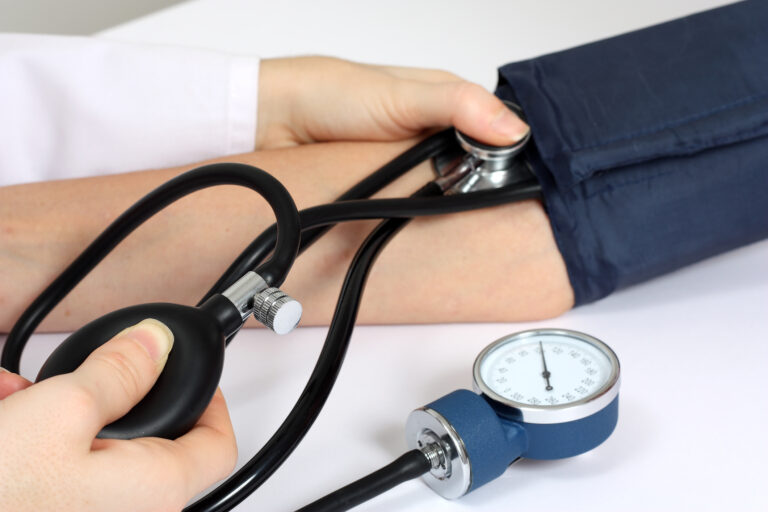High blood pressure (BP) is not a disease. It is the body’s way of compensating for something wrong. It is a protective mechanism. It is one of many signals the body gives us when it needs help. Medication to lower BP sabotages this natural protective mechanism and totally bypasses the cause. These drugs may reduce the numbers, but you still have high blood pressure, and drugs do nothing to eliminate the cause of the problem.
There are many types of hypertension, and even when labeled as “no known cause”, the body knows a cause exists. It’s our job to discover what it is. So, what are some of the known causes? We can divide them into 4 primary categories:
Substance Related: Alcohol is one of the major contributors. Others such as chronic dehydration, instability of blood sugar (especially hypoglycemia or diabetes), consumption of denatured table salt, excess meats in the diet, caffeine, food sensitivities (especially chocolate, corn, peanuts, nuts, pork, coffee, milk, and wheat), excess animal fats (if laden with pesticides, hormones and drugs) and trans fats (refined, hydrogenated or fried fats or oils).
Under this category we also look at the nutrients that may be missing: consuming ascorbic acid instead of the whole Vitamin C complex, consuming “d-alpha-tocopherol” form of Vitamin E instead of the whole Vitamin E Complex, deficiencies of specific minerals such as magnesium, calcium, potassium, sodium, chloride, zinc and iodine found in their natural complex & digestible form, lack of selenium naturally found in the whole Vitamin E Complex and CoQ10 creating an imbalance in the other essential Co-Enzymes.
Toxicity: Smoking is another major contributor, plus non-aspirin, non-steroidal anti-inflammatory drugs (such as ibuprofen), taking certain prescribed hormones, lead or cadmium toxicity, chemical or environmental sensitivities (such as to natural gas, gasoline fumes, chlorine, air pollution, auto exhaust, soft plastics, cleaning chemicals, perfumes, formaldehyde, pesticides, tobacco smoke, or other chemical exposures.
Mental/Emotional: High stress lifestyles, tendency to anger easily, or anxiousness.
Other: Obesity, lack of exercise, repeated episodes of apnea, and vertebral misalignments.
So as you can see, there are many factors that can contribute to hypertension. Utilizing medications without first correcting the problem is like putting a piece of duct tape on the warning indicator light on your car’s dashboard. The problem is still there, you are just covered up the warning.
Now, the important thing: What can we do about it? Lots. Blood pressure is something that can be controlled naturally. The most important method of preventing and treating hypertension is eating a healthy diet. First and foremost, eat real food. We all think we’re eating real food; however, most are not eating food that nourishes the body, without causing harm! Good foods are fresh, steamed vegetables (frozen when fresh is not available), good whole meats & fish (not processed), fresh fruits (not canned), fresh eggs (yes – eggs are good for blood pressure and cholesterol and anyone who tells you otherwise is teaching you archaic nutrition!), and vegetables (this is repeated intentionally – you need lots!). Replace your typical table salt with Celtic sea salt or “Real Salt”. Salt is a necessary part of healthy electrolyte balance, however, table salt with its missing mineral co-factors is poison to the heart. You also need Essential Fatty Acids. These keep the blood vessels soft and pliable, yet strong. They heal damage to vascular walls and support the body in making the healthy hormones that help control blood pressure. Good fats include avocados, RAW nuts and seeds, whole grains, green leafy vegies, fish (especially salmon) and properly raised meats. Eat whole grains and legumes, avoid processed ones. Eliminate the offenders that cause elevated blood pressure in the first place.
Know the supplements you are taking and if in doubt, ask. People are supposed to eat foods, not single nutrients. Whole foods are complexes of macronutrients, vitamins, minerals, fiber, phytochemicals, and other factors that in combination can lower BP. When people are given mineral supplements as isolated, inorganic minerals – BP barely budges. Supplementing the diet with various single nutrients sometimes lowers BP but results are always “ambiguous.” A combination of nutrients does the trick. With a good balanced diet, BP is brought down as quickly and as significantly as medications.
Other useful modalities include acupuncture, chiropractic and good nutritional counseling. Acupuncture has been used to control blood pressure successfully for thousands of years. Research shows an immediate change in blood pressure, and long lasting change with a series of treatments.
Lifestyle modifications: Lose excess weight. Use relaxation therapies often. Meditation and even church helps. Studies find those with strong religious beliefs have lower BP levels. Breathing techniques to minimize stress. Exercise. It has long been known that regular exercise can help control elevated BP.
Simple lifestyle changes could go a long way to controlling hypertension without medications.
After you’ve discovered the underlying cause of your high blood pressure and then you put in the corrective measures, and then you choose to go off your medication, here are some cautions. First, see a practitioner that specializes in working with blood pressure in this manner. Secondly, put the corrections in place for awhile, with appropriate supervision, monitoring your blood pressure regularly before starting a weaning process. Never go off a blood pressure medication suddenly. It will be a slow tapering-off process as your blood pressure improves. Doing it any other way is dangerous!
©2005 holly A. Carling, O.M.D., L.Ac., Ph.D.







